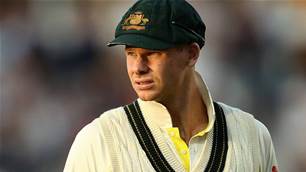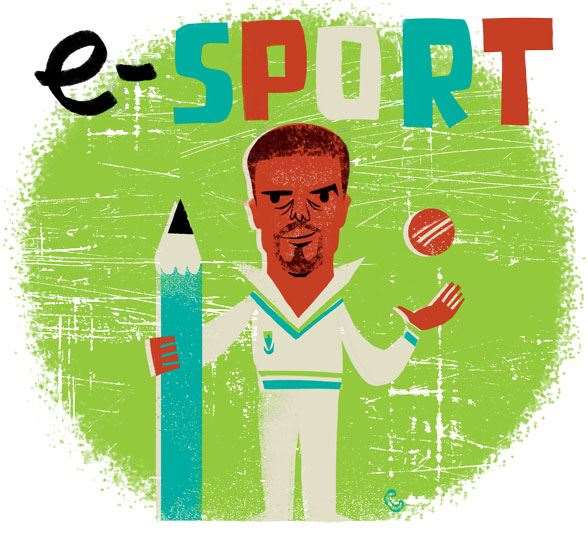And the games and tournaments in which they play are not "sports", either.
Consider the ultimate one-on-one cricket showdown between the best batsman and best bowler. A quick glance at the ICC’s official Test player rankings tells us Kumar Sangakkara would probably face up against Dale Steyn – but you might have your own fantasy combinations: Philander vs Johnson, both impressive all-rounders, perhaps? Say these two stars have agreed to play each other in a game of one-on-one cricket. At the MCG. Winner takes home five million dollars. Would you turn up to watch? It’ll be a ten-over match, so there’s at least two hours of entertainment on offer. Nup? What if they weren’t actually playing the sport themselves? What if a super-duper jumbo television was set up on the ground and a Sri Lankan doyen and Saffa quick played each other in a computer game? Just them, sitting in chairs, tweaking their thumbs, staring at the screen? Make that double nup, I’m guessing.
In other parts of the world, among other types of beings (not geeks; geeks can be normal ... sometimes), this kind of gig would draw thousands of spectators, dangle massive prizemoney to contestants and generate loads of interest across the internet, and among people living regular lives aboveground. Last July, for example, a computer gaming event called the International Dota 2 Championships (WTF?) sold out Seattle’s Key Arena, offering players a prize pool of $11m, massively upping the stakes of $2.8m from the year before. The interest in this phenomenon amongst its fanbase is completely understandable: the crowds turn up to watch the experts compete on exactly the same “field” as they would on their couch on a Wednesday after school. Lessons learnt from such displays of mastery no doubt build the knowledge base for that next internet battle against a 31-year-old hero from the backstreets of Bournemouth.
What isn’t fathomable, however, is how these superstars of the console are increasingly being referred to as “athletes” and the games they play as “sports”. The US government must think gamers are athletes, though, at least when it comes to granting visas. In 2013 a Canadian League of Legends player, known to his fans as “Shifter”, became the first pro gamer to be awarded a sports visa in the US. This gave gamer advocates a sturdier platform for arguing that their “athletes” were now equal in status and relevancy in the sportsphere with ice hockey players, baseballers or basketballers.
They might have a point ... if you forget the fact real sports actually require a fair degree of hand-eye coordination for their real athletes to partake in. All that’s required to master computer games, meanwhile, is a fair degree of knowing your way around the joystick, or hand-controller unit thingy; knowing that if you press the star button you’ll kill the dragon heaps faster.
This type of thing is not sport. We’ve already been over how popular it’s all becoming to the younger generation, but that doesn’t mean what they’re watching is “sport”. Cricket (real cricket) is sport. Rugby league, boxing and AFL are other examples of real sport. ESPN president John Skipper, when asked if computer game stadium events should be considered sports, replied “nup” as well. “It’s not a sport – it’s a competition,” he said at a launch one day. “Chess is a competition. Checkers is a competition. Mostly I’m interested in doing real sports.”
A sport recognised by the Olympics, shooting, while not particularly athletic, never the less requires aforementioned exceptional hand-eye coordination. Chess is also recognised by the IOC as a sport. But not by me. It’s chess. And poker? Flipping cards and hiding behind sunglasses? Hardly sport either, but a work colleague of mine hasn’t forgiven me for me for dissing the World Poker Major League, or whatever it’s called ... jury’s out on that one. Warney likes it, too. Imagine, as a kid, you asked Dad if he was free to take you downtown so you could sign up with the local computer game society, instead of the soccer or cricket club. Telling him you were interested in basketball would’ve been a foreign enough concept for a parent to grapple with back then, so sitting at a console fighting bazooka-carrying insurgents on a Saturday morning, with your sister battling it out like a real athlete on a frozen bitumen netball court? Yeah, right.
I prefer the fancier, modern name for this whole computer game pastime, that being e-sports. Interestingly, though, people in America can watch events like the International Dota 2 Championships on ESPN ... the worldwide leader in sports. So I’m confused.
Related Articles

The Ultimate NRL 2020 Season Preview

December 2019 Inside Sport hits ‘em for six














